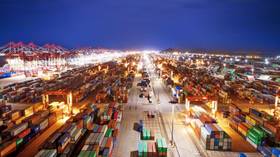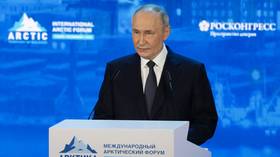US raises tariffs on $200 billion worth of Chinese imports from 10% to 25%

Washington has carried out the US president's latest threat, increasing import duties on $200 billion worth of Chinese goods from 10 percent to 25 percent, according to the Federal Register.
The hike will come into effect on May 10, with US trade representatives expected to establish a process for individuals seeking exclusions from additional tariffs for certain products.
Earlier Wednesday, US President Donald Trump said he would be happy to keep tariffs in place on Chinese imports. The president stressed that Beijing is mistaken if it hopes to negotiate trade later with a Democratic presidential administration.
....Guess what, that’s not going to happen! China has just informed us that they (Vice-Premier) are now coming to the U.S. to make a deal. We’ll see, but I am very happy with over $100 Billion a year in Tariffs filling U.S. coffers...great for U.S., not good for China!
— Donald J. Trump (@realDonaldTrump) May 8, 2019
“The reason for the China pullback & attempted renegotiation of the Trade Deal is the sincere HOPE that they will be able to 'negotiate' with Joe Biden or one of the very weak Democrats,” Trump said via Twitter.
“Guess what, that's not going to happen! China has just informed us that they (Vice-Premier) are now coming to the US to make a deal. We'll see, but I am very happy with over $100 Billion a year in Tariffs filling US coffers,” he added.
Also on rt.com IMF chief warns US-China trade spat poses ‘threat’ to world economyOn Monday, the US president issued another threat to raise the tariffs on Chinese imports as part of an ongoing trade spat between the world’s two biggest economies. The claim dragged down the global stocks along with crude futures.
The comment came as Beijing and Washington were preparing to meet in Washington later this week to hold another session of negotiations on mutual trade.
China and the US have been embroiled in a full-scale fight over tariffs since early 2018, when Trump accused Beijing of stealing trade secrets, forcing foreign companies to hand over technology as the price of access to the Chinese market, and subsidizing its own tech companies. As part of the standoff, the partners have imposed export tariffs on billions of mutual imports.
For more stories on economy & finance visit RT's business section















